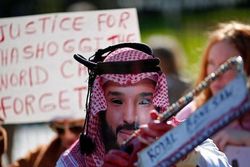 Saudi Arabia's efforts to muzzle dissidents living abroad is ongoing despite the ferocious international criticism it faced following the murder of Jamal Khashoggi, The Financial Times reported.
Saudi Arabia's efforts to muzzle dissidents living abroad is ongoing despite the ferocious international criticism it faced following the murder of Jamal Khashoggi, The Financial Times reported. RNA - Concerned that dissidents are tarnishing the reputation of Saudi Crown Prince Mohammad bin Salman (MbS) and his much-publicised reform programme, two unnamed sources told the FT that the kingdom is offering them incentives and promises they will be unharmed to encourage them to return.
Riyadh's crackdown on dissenting Saudi voices has been in the spotlight ever since Khashoggi, a Middle East Eye and Washington Post columnist, was assassinated by a Saudi hit squad in the kingdom's Istanbul consulate in early October.
Last week, Middle East Eye reported that the FBI approached several Saudi and Arab dissidents living in the United States in the weeks following Khashoggi's death, warning them that they too could be at threat.
The agency warned one dissident they were at risk as recently as six weeks ago, people familiar with the matter told MEE.
Sources told the FT that the Saudi government has commissioned a report on the topic, amid a growing sense of unease about the prominence of critical members of Saudi diaspora.
“A big part of their concern is that this group abroad is engaged in lobbying at the UN, EU and Congress in the US,” a Saudi activist based in Europe told the FT.
“They have played a central role in the backlash against Saudi Arabia in recent months because they have been working in an unprecedented way. If they remained silent the international community would have forgotten and moved on,” the activist added.
The report, which is unlikely to be released upon completion, recommends the government take a softer approach to lure citizens home and estimates that the number of Saudi political asylum-seekers could reach 50,000 by 2030.
Officials are said to be offering dissidents a range of assurances about their safety, with some who sought refuge in the 1990s in Western capitals such as London and Washington said to have already returned after cutting such deals.
“Someone close to the leadership or another mediator would typically contact you and say: ‘I have a personal message from the crown prince’, promising that there would be no harm or jail time if you decide to take up the offer,” a Saudi exile who had been approached told the FT.
Since MbS rose to power in 2017, the Saudi government has begun a programme of sweeping reforms while cracking down on any opinions that diverge from the official line.
The repression, which has included jailing and torturing women rights activists as the kingdom has eased certain restrictions on Saudi women the activists had called to be abolished, has driven several Saudis to seek a new life abroad.
According to the United Nations' refugee agency, at least 815 Saudis applied for asylum in 2017, up from 195 in 2012.
Primarily based in the West, these Saudis have caused a headache for Riyadh by becoming vocal critics as the government attempts to portray a modernising and reformist image.
In 2016, the Shura council - the king's advisory committee - warned that some one million Saudis were living abroad and called on the government to “investigate this phenomenon and its causes before it becomes a security threat or a social dilemma”, according to local media reports.
Saudi Arabia's softer touch in its attempts to rein in its dissidents comes as MbS faces renewed criticism for his likely role in Khashoggi's murder.
Last month, the UN special rapporteur on extrajudicial executions released a report which stated there was “credible evidence” that the crown prince and other senior officials were responsible for the murder.
The CIA concluded that Khashoggi, a Virginia resident, almost certainly signed off on the operation. The administration of US President Donald Trump, however, has stood by the kingdom's 33-year-old de facto ruler.
847/940